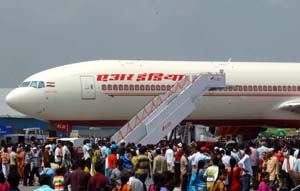
"Such offers add to the abysmally small flyer base in the country. The lower the fares, wider is the flyer-base. When a person flies for the first time and observes the huge time-saving thereof, it often becomes difficult for him/her to take a long journey by train," Amber Dubey, partner and head, aerospace and defence, KPMG said.
"Families use these discounted tickets to shift from trains to flights and get more bang out of their three-four day vacation. Airlines get incremental traffic, better seat factors and advance cash. A typical win-win for all," Dubey added.
Since the start of the year, the Indian aviation sector has seen three promotional schemes offering 30-50 percent discount on fares.
"The recent discounts are to fill the 10 percent seats by giving an alternative to the AC1/2 train passenger," Rajiv Chib, associate director, aerospace and defence at PricewaterhouseCoopers said.
"No airlines can afford discounts unless they have a strategy in mind. Discount is based on the premise that all airlines, even in peak season, have approximately 10 percent of vacant seats. At times like now with the exam season, it is much more."
The new promotional scheme comes after the low cost carrier (LCC) SpiceJet launched two previous discount schemes that led to other airlines also offer the promotional fares.
"These advance purchase offers are a win-win for customers, for airlines, and for the travel industry and the economy overall, as it leads to significant demand stimulation, customers get to enjoy deeply discounted fares, airlines get to reduce wastage of seats," said airline's new chief operating officer Sanjiv Kapoor.
Other carriers have followed suit and tried to face the competition head on.
"In a highly competitive market with little differentiation between airlines, a discount by one has to be matched by all others. There's no option. Though it comes as a rude surprise to other carriers, they do plan for such scenarios in advance," said Dubey.
Passengers, travel agents and online booking websites have been quick to grab the new schemes.
"These flash sales are becoming a regular feature. Besides stimulating demand, these are also prompting Indians to plan their travel in advance, as these sales encourage travel planning in a particular timeframe and at least a month in advance from the date of the promotions," said Vikram Malhi, general manager, south and southeast Asia, Expedia.
"We are already seeing strong demand on the key leisure destinations like Goa and Kerala and bookings have more than doubled post the announcement. We expect other airlines to follow suit with similar discounts as these prices are sure to strike a chord with the leisure traveller," said Sharat Dhall, president, Yatra.com.
Some in the industry say the promotional airfares should be seen in the context of AirAsia India's entry into the market. If this is true, then an interesting fare war could be on the anvil in the summer of 2014.
But Dubey begs to differ. "The discount is more to stimulate buying and to generate cash quickly. It cannot be linked entirely to AirAsia's entry into India. International airlines come with a 10-15 year horizon and factor in aggressive reception from their competitors in the initial phases."








Comments
Add new comment